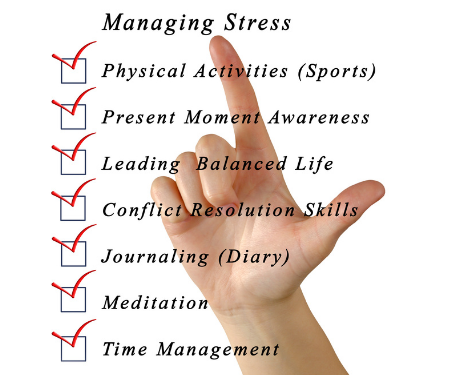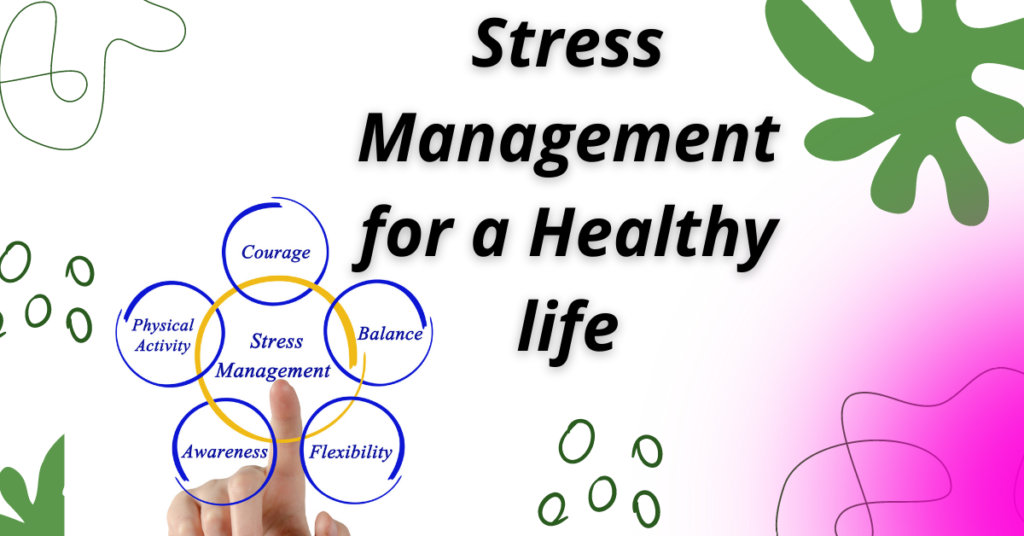Achieving a healthy life balance requires regular relaxation techniques (Stress Management). Everyone is different, so there is no single ‘right’ set of techniques that will work for everyone. But there are some simple principles of relaxation that apply to everybody. Undoubtedly, the best way to learn about relaxation techniques is to try them out in practice.
Fundamentals of Stress
Stress is a typical psychological and physical response to life’s challenges. Stress can be beneficial in that it motivates you to perform well. However, several problems on a daily basis, such as sitting in traffic, completing deadlines, and paying expenses, might overwhelm anyone.
For your safety, your brain is pre-programmed with an alarm system. When your brain detects a threat, it sends a flood of hormones into your body, which raises your heart rate and blood pressure. This “fight-or-flight” response prepares you to face the danger.
Your body is designed to revert to a normal, calm condition once the threat has passed. Unfortunately, due to the never-ending complexities of modern life, certain people’s fire alarms never just go.
To reset your alarm system, you can employ a range of stress management techniques. It can assist you in adapting your thoughts and body (resilience). If you don’t have it, your body can remain on high alert all of the time. Chronic stress can lead to serious health issues in the long run.
Don’t pause till your health, relationships, or life quality are harmed by stress. Begin using stress-reduction tactics right away.
Types of Stress
Because there are several types of stress – acute stress, episodic acute stress, and chronic stress — each with its own characteristics, symptoms, duration, and treatment techniques, stress management can be hard and confounding. Let’s take a look at each one individually.
Acute Stress
This is the most common type of stress. It’s your body’s immediate reaction to a new challenge or demand. It may be caused by a scary situation (like seeing a huge dog charging at you) or an unpleasant one (like getting stuck in traffic). Acute stress can keep you alert, motivated and ready to avoid danger.
Chronic Stress
Unlike acute stress, chronic stress lasts for prolonged periods of time and is most often caused by emotional demands placed on you. Situations that are out of your control, such as noise from a construction site next door or the behaviour of a dysfunctional coworker, can also cause chronic stress. This type of ongoing physiological arousal can wear you down both mentally and physically over time.
Episodic Acute Stress
This is what some people call “weekend warrior” syndrome. If all of your daily hassles seem to accumulate until Friday night when you finally blow up at someone close to you, then you have episodic acute stress.
Stress reduction
To keep track of your stress, start by identifying your stressors. What makes you impatient, nervous, concerned, or angry? Do you frequently get headaches or stomachaches that aren’t caused by a medical condition?

Workplace pressures, relationship issues, and financial concerns are all evident stressors. However, minor irritations and demands, such as waiting in a long line or missing a meeting, can contribute to your stress level.
Even seemingly pleasant events like weddings or home purchases can be stressful. Any change in one’s life might be a source of anxiety.
Consider ways for dealing with your stress triggers once you’ve recognised them. Finding out what you can manage is an excellent place to start. If tension is keeping you awake at night, for example, removing the TV and computer from your chamber and allowing your mind to relax before bed could be the answer.
You may only be able to adjust your reaction in some cases, such as when stress is caused by heavy demands at work or a loved one’s illness.
You don’t have to figure things out all by yourself. Whether you need someone to listen to you, help with child care, or a ride to work while your car is in the shop, seek help and support from family and friends.
Your life will continue to be filled with stress. Stress management is another something that needs to be done on a regular basis. You may prevent some of the negative effects of stress and boost your ability to cope with problems by paying attention to what triggers your stress and practising relaxation techniques.
Techniques for relaxation
We are living in a high-stress world. There’s no doubt about it. Whether it’s work, home, school, or relationships, the stresses seem to pile up and the list of things we need to do never ends. It’s important for our health to learn how to manage that stress so that it doesn’t cause problems with our health and well being.
Learning different techniques for relaxation can help you reduce your stress level and improve your quality of life.
Here are a few suggestions:

Yoga is an excellent technique for relaxation. It’s also a great exercise because it combines stretching with deep breathing. Yoga is unlike other exercises which focus on muscular strength, endurance or flexibility; yoga is all about mind control and concentration. The mind-body connection between muscles and mind becomes stronger with the continued practice of yoga.
Meditation is another popular technique used for relaxation purposes and management of stress. Meditation has been shown to be beneficial for many people dealing with various types of illnesses including cancer, chronic pain, anxiety disorders and heart disease. Meditation allows us to focus on the moment and relax our bodies, minds and souls by doing so.
Focus on an object: Focus on an object in the room — may be a candle or a flower — and allow yourself to look at nothing else. Focus on the colours, shapes, and textures that make up the object. If your mind starts to wander, gently bring it back to the object.
Concentrate on your breathing. This can be done while sitting, walking, or even lying down. Start by taking deep breaths in through your nose and slowly exhaling out of your mouth. Do this for three minutes or until you feel relaxed enough to stop. When you find yourself thinking of something other than what you’re concentrating on, gently bring your focus back to your breathing.
When you’re under stress, you might feel tired, have problems sleeping or even have trouble thinking. There are many things you can do to help reduce your stress levels.
These include:
Getting physical activity
Reducing alcohol and caffeine intake
Taking time off work
Avoiding or limiting the use of tobacco products
Spending time with family and friends
Eating a little chocolate
Watching a funny video
Soaking in the tub
Meditating
Practice acts of kindness.
Takeaway
These things can help you ease the stress in your life by building happiness and resilience. Stress is a normal part of life, but it’s important to make sure it doesn’t keep you from enjoying it.
Read Also: Benefits of organic food on health

